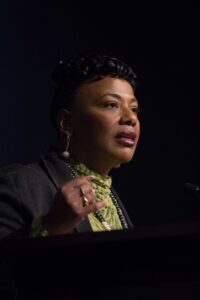Tag: Martin Luther King
Dr. Bernice A. King Addresses PC Community for Rev. Dr. Martin Luther King, Jr. Convocation
by The Cowl Editor on January 19, 2018
Campus
King Discusses Nonviolent Protest and Creating the “Beloved Community”
by Ernie Andreoli ’18
News Staff

Dr. Bernice A. King, a distinguished minister and the youngest daughter of the late Rev. Dr. Martin Luther King, Jr. and Coretta Scott King, presented the keynote address at the inaugural Rev. Dr. Martin Luther King, Jr. Convocation at Providence College on Thursday, January 18. Over 600 students, faculty, and members of the Providence community packed into the Peterson Recreation Center to hear Dr. King’s lecture on her father’s legacy, as well as the importance of sustained civil rights activism.
In commemoration of the 50th anniversary of her father’s assassination, King stressed that “together we win with love for humanity.” After an introduction by Dr. Hugh F. Lena, provost and senior vice president for academic affairs, Father Brian Shanley, O.P., greeted the crowd by touching upon the late Dr. King’s vision of the “beloved community.” Fr. Shanley reiterated that an interconnected community and a “just social order” could only be accomplished through “faith, hope, and love.” As a part of the MLK Convocation week on campus, Fr. Shanley honored Dr. Francis P. MacKay, Dr. René E. Fortin (posthumous), Dr. Mark N. Rerick (posthumous), and Rev. Robert A. Morris, O.P. (posthumous) for creating the Rev. Dr. Martin Luther King, Jr. Scholarship at Providence College.
Fifty years ago, Rev. Morris, a champion of diversity and inclusion, encouraged the College’s administrators to create a scholarship for incoming students that commemorated the civil rights achievements of the late Rev. Dr. King Jr. During the fall semester of 1968, a cohort of students received this notable award. Today, 100 students have received this scholarship from the inspiring works of these four honorees and their commitment to equality, diversity, and inclusion.
Following the inaugural presentation of the MLK Vision Award, Ralph E. Tavares, director of multicultural student success and assistant dean of undergraduate studies, spoke of the continuous importance of selflessness, dedication, and love throughout our lives and communities. While Tavares acknowledged that polarized political ideologies and instances of hatred have divided the College’s community to a certain extent, he asserted that “love will keep us planted.”
Following Tavares’s remarks, Phionna-Cayola Claude ’18, president of Student Congress, emphasized the “power of conversation” to combat bigotry. Claude contended that while all individuals hold different beliefs, equality and justice are essential for communal development and self-actualization. Prior to introducing Dr. King as the keynote speaker, Claude stated that Dr. King is the living example of her father’s purpose.
In commemoration of her father’s life, Dr. King encouraged all in attendance to perform 50 acts of kindness and service to individuals of another race between now and April 4, the day her father was assassinated in Memphis, in an effort to mitigate the current racial climate. Furthermore, Dr. King invited all attendees to take part in the March for Humanity in Atlanta on April 9 in an attempt to connect with one another, impede racial discrimination, and enact positive change in people and institutions.
According to Dr. King, nonviolent resistance, a practice her father tirelessly encouraged, is the most necessary tactic to be used in social movements, as well as throughout our lives. Specifically, in a time of technological connectedness and social unrest, Dr. King proclaimed that “when it comes to humanity, we cannot have losers.” Ultimately, in order to “create a beloved community,” Dr. King exclaimed that nonviolent resistance will lead to our spiritual and moral development.
Dr. King examined her father’s studies in theology and civil activism, and how these teachings fare in 2018. As her father declared in the mid-1950s, she reiterated that the Montgomery Bus Boycott “was not a victory over white people.” Rather, Dr. King emphasized that the political and social protest was a “victory over injustice.” In order to expose the ugliness of violence and injustice in this day and age, Dr. King encouraged all in attendance to face prejudice through love.
Following Dr. King’s address, Tavares moderated a Q&A session between Dr. King and those in attendance. Adriel Antoine ’18, president of PC’s chapter of the NAACP, asked Dr. King for her thoughts on how to keep the momentum going with current social and political resistance movements. “People are responding, but they are not organizing,” stated Dr. King. While she acknowledged that protests are an important component of nonviolent resistance, Dr. King insisted that “the goal is change.”
Dr. King encouraged all in attendance to make justice, freedom, and righteousness a reality. In January 2012, Dr. King was appointed chief executive officer of The King Center, a nonprofit organization founded by Coretta Scott King in 1968. Located in Atlanta, Georgia, this resource institution is committed to nonviolent social change in honor of the late Rev. Dr. King Jr., Mahatma Gandhi, and Rosa Parks, among other influential social activists. Dr. King graduated from Spelman College with a B.A. in psychology in 1985 and obtained her J.D. and Master of Divinity from Emory University in 1990. Reflecting on the convocation, Jayson Sanderson ‘21 noted “It was breathtaking.” Sanderson went on to state that Dr. King’s lecture provided “a lot of encouragement to people of color, as well as the entire PC Community.”
